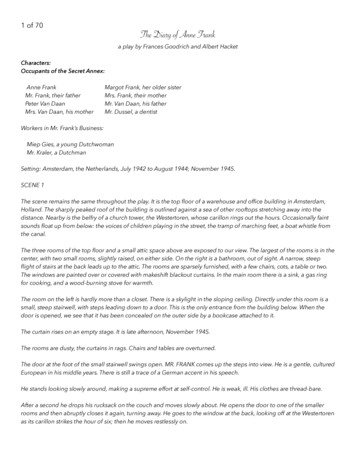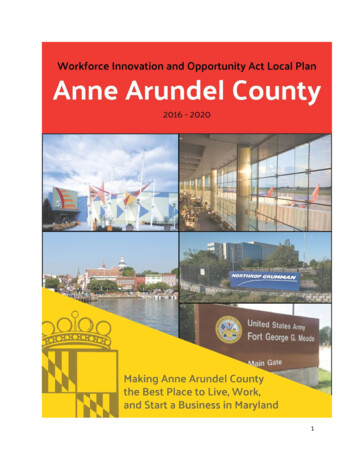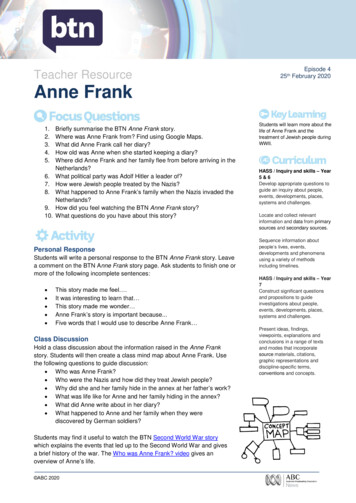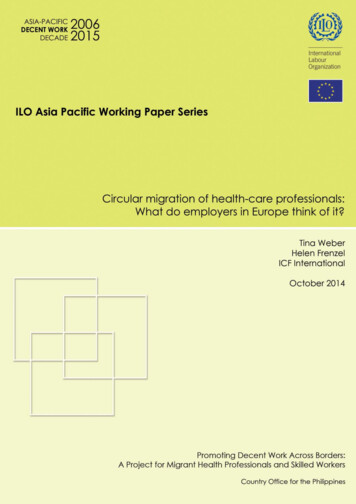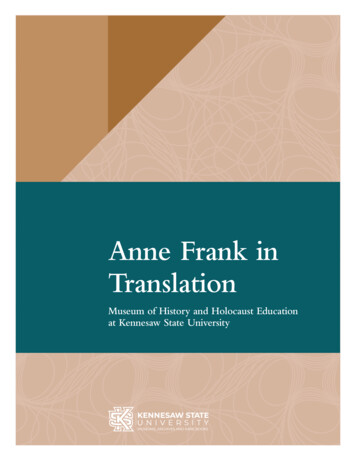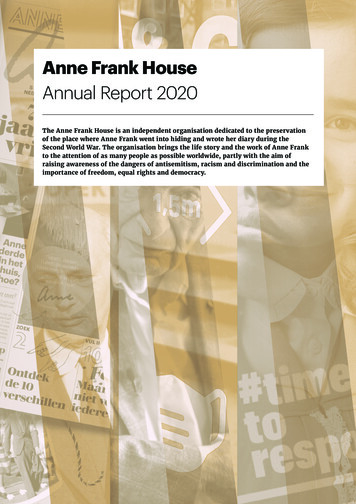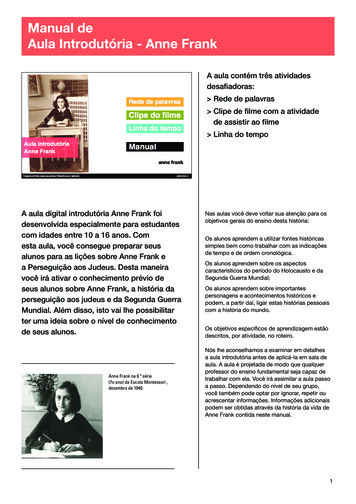
Transcription
Anne C. Frenzel, List of PublicationsPeer-reviewed Journal ArticlesJacob, B.*, Frenzel, A. C.*, & Stephens, E. J. (2017). Good teaching feels good--but what is"good teaching"? Exploring teachers' definitions of teaching success in mathematics.ZDM Mathematics Education. doi: 10.1007/s11858-017-0848-6 [*both authorscontributed equally]Wang, H., Hall, N. C., Goetz, T., & Frenzel, A. C. (2017). Teachers’ goal orientations: Effectson classroom goal structures and emotions. British Journal of Educational Psychology,87, 90–107. doi: 10.1111/bjep.12137Frenzel, A. C., Pekrun, R., Goetz, T., Daniels, L. M., Durksen, T. L., Becker-Kurz, B.,Klassen, R. M. (2016). Measuring Teachers’ Enjoyment, Anger, and Anxiety: TheTeacher Emotions Scales (TES), Contemporary Educational Psychology, 46, 148-163.doi: http://dx.doi.org/10.1016/j.cedpsych.Keller, M. M., Woolfolk Hoy, A. E., Goetz, T., & Frenzel, A. C. (2016). Teacher enthusiasm:Reviewing and redefining a complex construct. Educational Psychology Review, 28,743-769. doi:10.1007/s10648-015-9354-yRoos, A.-L., Bieg, M., Goetz, T., Frenzel, A. C., Taxer, J., Zeidner, M. (2015). Experiencingmore mathematics anxiety than expected? – Contrasting trait and state anxiety in highachieving students. High Ability Studies. DOI: 10.1080/13598139.2015.1095078Goetz, T., Becker, E. S., Bieg, M., Keller, M. M., Frenzel, A. C., & Hall, N. C. (2015). Theglass half empty: How emotional exhaustion affects the state-trait discrepancy in selfreports of teaching emotions. PLoS ONE 10(9): e0137441.doi:10.1371/journal.pone.0137441Frenzel, A. C.*, Becker-Kurz, B.*, Pekrun, R., & Goetz, T. (2015). Teaching this class drivesme nuts! – Examining the person and context specificity of teacher emotions. PLoSONE. doi: 10(6): e0129630.doi:10.1371/journal.pone.0129630 (* authors contributedequally)Becker, E. S., Keller, M. M., Goetz, T., Frenzel, A. C., Taxer, J. L. (2015). Antecedents ofteachers’ emotions in the classroom: An intraindividual approach. Frontiers inPsychology. doi: 10.3389/fpsyg.2015.00635Taxer, J. L., & Frenzel, A. C. (2015). Facets of teachers' emotional lives: A quantitativeinvestigation of teachers' genuine, faked, and hidden emotions. Teaching and TeacherEducation, 42, 78-88. doi: dx.doi.org/10.1016/j.tate.2015.03.003Keller, M. M., Chang, M.-l:, Becker, E. S., Goetz, T., & Frenzel, A. C. (2014). Teachers’emotional experiences and exhaustion as predictors of emotional labor in the classroom:An experience sampling study. Frontiers in Psychology. 5: 1442. doi:10.3389/fpsyg.2014.01442Goetz, T., Haag, L., Lipnevich, A. A., Keller, M., Frenzel, A. C., Collier, A. P. M. (2014).Between-domain relations of students’ academic emotions and their judgments of schooldomain similarity. Frontiers in Psychology. 5: 1153. doi: 10.3389/fpsyg.2014.01153Goetz, T., Frenzel, A., C., Hall, N. C., Nett, U., Pekrun, R., & Lipnevich, A. (2014). Types ofBoredom: An Experience Sampling Approach. Motivation and Emotion, 38, 401-419.Daniels, L., Frenzel, A. C., Stupnisky, R. H., Stewart, T. L., Perry, R. P. (2013). Personalgoals as predictors of intended classroom goals: Comparing elementary and secondaryschool pre-service teachers. British Journal of Educational Psychology, 83, l, A. C., Pekrun, R., Dicke, A.-L., & Goetz, T. (2012). Beyond Quantitative Decline:Conceptual Shifts in Adolescents' Development of Interest in Mathematics.Developmental Psychology, 48(4), 1069-1082.Klassen, R. M., Perry, N. E., & Frenzel, A. C. (2012). Teachers’ relatedness with students:An underemphasized aspect of teachers’ basic psychological needs. Journal ofEducational Psychology, 104, 150-165Page 1 of 11
Nett, U. E., Goetz, T., Hall, N. C., & Frenzel, A. C. (2012). Metacognitive strategies and testperformance: An experience sampling analysis of students’ learning behavior. EducationResearch International. Article ID 958319.Twardella D., Matzen, W., Lahrz, T., Burghardt, R., Spegel, H., Hendrowarsito, L., Frenzel,A. C., & Fromme, H. (2012). Effect of classroom air quality on students' concentration:Results of a cluster randomized cross-over experimental study. Indoor Air, 22, 378-87.doi: 10.1111/j.1600-0668.2012.00774.xXiong, J. M., Gong, S. Y., & Frenzel, A. C. (2011). The Relationship among Senior HighSchool students' academic emotions in mathematics, learning strategies andmathematics achievement. Educational Research and Experiment, 6, 89-92. (inChinese)Dettmers, S., Trautwein, U., Lüdtke, O., Kunter, M., Baumert, J., Goetz, T., Frenzel, A. C., &Pekrun, R. (2011). Students‘ emotions during homework: Antecedents andconsequences for homework behavior and mathematics achievement. ContemporaryEducational Psychology, 36, 25-35.Goetz, T., Frenzel, A. C., Lüdtke, O., & Hall (2011). Between-domain relations of academicemotions: Does having the same instructor make a difference? The Journal ofExperimental Education, 79, 84–101.Kunter, M., Frenzel, A. C., Nagy, G., Baumert, J., & Pekrun, R. (2011). Teacher enthusiasm:Dimensionality and context specificity. Contemporary Educational Psychology, 36(4),289-301. doi: 10.1016/j.cedpsych.2011.07.001Pekrun, R., Goetz, T., Frenzel, A. C., Barchfeld, P., & Perry, R. (2011). Measuring emotionsin students’ learning and performance: The achievement emotions questionnaire (AEQ).Contemporary Educational Psychology, 36, 36-48.Frenzel, A. C., Goetz, T., Pekrun, R., & Watt, H. M. G. (2010). Development of mathematicsinterest in adolescence: Influences of gender, family and school context. Journal ofResearch on Adolescence, 20, 507-537.Goetz, T. & Frenzel, A. C. (2010). Über- und Unterforderungslangeweile imMathematikunterricht. Zeitschrift Empirische Pädagogik. 24(2), 113-134Goetz, T. & Frenzel, A. C., Stöger, H., (2010). Antecedents of everyday positive emotions:An experience sampling analysis. Motivation and Emotion, 34, 49-62.Preckel, F., Goetz, T. & Frenzel, A. C. (2010). Ability grouping of gifted students: Effects onacademic self-concept and boredom. British Journal of Educational Psychology. 80, 451472Goetz, T., Cronjaeger, H., Frenzel, A. C., Lüdtke, O., & Hall, N. C. (2010). Academic selfconcept and emotion relations: Domain specificity and age effects. ContemporaryEducational Psychology, 35, 44-58.Frenzel, A. C. (2009). Ganztagsschule im Spiegel der aktuellen Forschung. Zeitschrift fürSoziologie der Erziehung und Sozialisation, 29, 27-28.Frenzel, A. C., Goetz, T., Lüdtke, O., Pekrun, R., & Sutton, R. (2009). Emotionaltransmission in the classroom: Exploring the relationship between teacher and studentenjoyment. Journal of Educational Psychology, 101, 705–716.Goetz, T., Frenzel, A. C., Pekrun, R., & Hall, N. C. (2008). Antecedents of academicemotions: Testing the internal/external frame of reference model for academic enjoyment.Contemporary Educational Psychology, 33, 9-33Frenzel, A. C., Pekrun, R., & Goetz, T. (2007). Girls and mathematics – a “hopeless” issue?A control-value approach to gender differences in emotions towards mathematics.European Journal of Psychology of Education, 22, 497-514.Frenzel, A. C. & Goetz, T. (2007). Emotionales Erleben von Lehrkräften beim Unterrichten.Zeitschrift für Pädagogische Psychologie, 21, 283-295.Page 2 of 11
Frenzel, A. C., Pekrun, R., & Goetz, T. (2007). Perceived learning environments andstudents’ emotional experiences: A multilevel analysis of mathematics classrooms.Learning and Instruction, 17, 478-493. [Awarded Top Cited Article 2007-2011 in L&I]Frenzel, A. C., Thrash, T. M., Pekrun, R., Goetz, T. (2007). Achievement emotions inGermany and China: A cross-cultural validation of the Academic EmotionsQuestionnaire-Mathematics. Journal of Cross-Cultural Psychology, 38(3), 302-309.Goetz, T., Frenzel, A. C. & Pekrun, R. (2007b). Regulation von Langeweile im Unterricht.Was Schülerinnen und Schüler bei der „Windstille der Seele“ (nicht) tun.Unterrichtswissenschaft, 35 (4), 312-333.Goetz, T., Frenzel, A. C., Pekrun, R., Hall, N. C., & Lüdtke, O. (2007). Between- and withindomain relations of students’ academic emotions. Journal of Educational Psychology, 99,715-733.Frenzel, A. C., Jullien, S., & Pekrun, R. (2006). Thomas hat 60 Euro gespart. oder 1/4x 60 x: Freude und Angst beim Bearbeiten von Text- und Rechenaufgaben. MathematikLehren, 135, 57-59.Frenzel, A. C., Pekrun, R. & Goetz, T. (2006). Emotionale Voraussetzungen des Lernens. InK.-H. Arnold, U. Sandfuchs & J. Wiechmann (Hrsg.), Handbuch Unterricht (S. 579-583).Bad Heilbrunn: Klinkhardt.Goetz, T. & Frenzel, A. C. (2006). Phänomenologie schulischer Langeweile. Zeitschrift fürEntwicklungspsychologie und Pädagogische Psychologie, 38(4), 149-153.Goetz, T., Frenzel, A. C. & Haag, L. (2006). Ursachen von Langeweile im Unterricht.Empirische Pädagogik, 20(2), 113-134.Goetz, T., Frenzel, A. C., Pekrun, R., & Hall, N. C. (2006). The domain specificity ofacademic emotional experiences, Journal of Experimental Education, 75(1), 5-29.Goetz, T., Hall, N. C., Frenzel, A. C., & Pekrun, R. (2006). A hierarchical conceptualizationof enjoyment in students. Learning and Instruction, 16, 323-338.Goetz, T., Pekrun, R., Zirngibl, A. C., Jullien, S., Kleine, M., vom Hofe, R. & Blum, W.(2004). Leistung und emotionales Erleben im Fach Mathematik: LängsschnittlicheMehrebenenanalysen. Zeitschrift für Pädagogische Psychologie, 18(4), 201-212.Zirngibl, A. C. & Koch, I. (2002). The impact of response mode on implicit and explicitsequence learning. Experimental Psychology, 49, 153-162Book Sectionsand (Co-)Edited VolumesPekrun, R., Muis, K., Goetz, T. (in press). Emotions in School.Götz, T., Frenzel, A. C., Pekrun, R. (in press). Psychologische Bildungsforschung. In R.Tippelt & B. Schmidt (Hrsg.), Handbuch Bildungsforschung. Wiesbaden: VS Verlag fürSozialwissenschaften. [4. Auflage]Frenzel, A. C., Goetz, T., & Pekrun, R. (2015). Emotionen. In E. Wild & J. Möller (Hrsg.),Lehrbuch Pädagogische Psychologie (2nd edition, pp. 201-224). Heidelberg: Springer.Frenzel, A. C. (2014). Teacher emotions. In E. A. Linnenbrink-Garcia & R. Pekrun (Eds.),International Handbook of Emotions in Education (pp. 494-519). New York: Routledge.Keller, M. M., Frenzel, A. C., Goetz, T., Pekrun, R., & Hensley, L. (2014). Exploring teacheremotions: A literature review and an experience sampling study. In P. W. Richardson, S.Karabenick, & H. M. G. Watt (Eds.), Teacher Motivation: Theory and Practice (pp. 69-82).New York: Routledge.Frenzel, A. C., Stephens, E. J. (2013). Emotions. In: N. C. Hall &T. Goetz, Emotion,motivation, and self-regulation: A handbook for teachers (pp. 1-56). Bingley, UK:Emerald.Page 3 of 11
Frenzel, A. C., & Stephens, E. J. (2011). Emotionen. In T. Götz (Hrsg.). Emotion, Motivationund Selbstreguliertes Lernen (S. 15-77). Paderborn: Verlag Ferdinand Schöningh.Pekrun, R., Goetz, T., & Frenzel, A. C. (2010). Die Bildungskarriere im Sekundärbereich. InC. Spiel, R. Reimann, B. Schober & P. Wagner (Hrsg.). Bildungspsychologie (S. 111130). Göttingen: Hogrefe.Frenzel, A. C., Goetz, T., & Pekrun, R. (2009). Emotionen. In E. Wild & J. Möller (Hrsg.),Lehrbuch Pädagogische Psychologie (pp. 205-234). Heidelberg: Springer.Frenzel, A. C., Goetz, T., Pekrun, R. & Jacob, B. (2009). Antecedents and effects ofteachers’ emotional experiences: An integrated perspective and empirical test. In P. A.Schutz & M. Zembylas (Eds.). Advances in teacher emotion research: The impact onteachers’ lives (pp. 129-152). New York: Springer.Goetz, T., Frenzel, A. C., & Pekrun, R. (2009). Psychologische Bildungsforschung. In R.Tippelt (Hrsg.), Handbuch Bildungsforschung (2. Aufl., S. 71-92). Opladen: Leske &Budrich.Pekrun, R., & Frenzel, A. C. (2009). Persönlichkeit und Emotion. In V. Brandstätter & J. H.Otto (Hrsg.), Handbuch Allgemeine Psychologie. Motivation und Emotion (2. Aufl., S.686-696). Göttingen: Hogrefe.Frenzel, A. C., Goetz, T., & Pekrun, R. (2008). Ursachen und Wirkungen vonLehreremotionen. In M. Gläser-Zikuda & J. Seifried (Hrsg.), Analyse und Förderung vonLehrerexpertise (pp. 187-209). Münster: Waxmann.Frenzel, A. C., Götz, T., & Pekrun, R. (2008). Kontroll-Wert-Modell der Prüfungsangst. In J.Zumbach & H. Mandl (Eds.), Pädagogische Psychologie in Theorie und Praxis. Einfallbasiertes Lehrbuch (pp. 275-284). Göttingen: Hogrefe.Goetz, T., Frenzel, A. C., & Pekrun, R. (2008). Sozialklima in der Schule. In W. Schneider &M. Hasselhorn, Handbuch der Psychologie, Band Pädagogische Psychologie (pp. 503514). Göttingen: Hogrefe.Götz, T., Frenzel, A. C., & Pekrun, R. (2008). Emotionale Intelligenz beim Lernen. In J.Zumbach & H. Mandl (Eds.), Pädagogische Psychologie in Theorie und Praxis. Einfallbasiertes Lehrbuch (pp. 255-263). Göttingen: Hogrefe.Pekrun, R., Frenzel, A., Goetz, T., & Perry, R. P. (2007). The control-value theory ofachievement emotions: An integrative approach to emotions in education. In P. A. Schutz& R. Pekrun (Eds.), Emotions in education (pp. 13-36). San Diego: Academic Press.Pekrun, R., vom Hofe, R., Blum, W., Frenzel, A. C., Goetz, T. Wartha, S. (2007).Development of Mathematical Competencies in Adolescence: The PALMA LongitudinalStudy. In M. Prenzel (Ed.). Studies on the educational quality of schools. The final reporton the DFG Priority Programme (pp. 17-37). Münster, Germany: Waxmann.Schütte, K., Frenzel, A. C., Asseburg, R., & Pekrun, R. (2007). Schülermerkmale,naturwissenschaftliche Kompetenz und Berufserwartung. In M. Prenzel, C. Artelt, J.Baumert, W. Blum, M. Hammann, E. Klieme, R. Pekrun (Hrsg.). PISA 2006. DieErgebnisse der dritten internationalen Vergleichsstudie. Münster: Waxmann.Frenzel, A. C., Pekrun, R., & Zimmer, K. (2006). Selbstvertrauen, Engagement undLernverhalten in Mathematik. In PISA-Konsortium Deutschland (Hrsg.): PISA 2003.Untersuchungen zur Kompetenzentwicklung im Verlauf eines Schuljahres (Seiten 195208). Münster: Waxmann.Goetz, T., Frenzel, A. C., Pekrun, R., & Hall, N. C. (2006). Emotionale Intelligenz im Lernund Leistungskontext. In R. Schulze, P. A. Freund & R. D. Roberts (Hrsg.), EmotionaleIntelligenz. Ein Internationales Handbuch (S. 237-256). Göttingen: Hogrefe.Pekrun, R., vom Hofe, R., Blum, W., Goetz, T., Wartha, S., Frenzel, A. C. , & Jullien, S.(2006). Projekt zur Analyse der Leistungsentwicklung in Mathematik (PALMA).Entwicklungsverläufe, Schülervoraussetzungen und Kontextbedingungen vonPage 4 of 11
Mathematikleistungen bei Schülerinnen und Schülern der Sekundarstufe I. In M. Prenzel& L. Allolio-Näcke, (Hrsg.), Untersuchungen zur Bildungsqualität von Schule.Abschlussbericht des DFG-Schwerpunktprogramms (S. 21-53). Münster: Waxmann.Goetz, T., Frenzel, A. C., Pekrun, R., & Hall, N. (2005). Emotional intelligence in the contextof learning and achievement. In R. Schulze & R. D. Roberts (Eds.), Emotionalintelligence: An international Handbook (pp. 233-253). Cambridge, MA: Hogrefe & HuberPublishers.Goetz, T., Zirngibl, A. C., & Pekrun, R. (2003). Lern- und Leistungsemotionen vonSchülerinnen und Schülern. In T. Hascher, Schule positive erleben. Ergebnisse undErkenntnisse zum Wohlbefinden von Schülerinnen und Schülern (pp. 49-66). Bern,Switzerland: Haupt.Goetz, T., Zirngibl, A. C., Hall, N., & Pekrun, R. (2003). Emotions, learning and achievementfrom an educational-psychological perspective. In P. Mayring & C. v. Rhoeneck (Eds.),Learning emotions. Berlin: Peter Lang.Pekrun, R. & Frenzel, A. C. (2005): Schülermerkmale im Ländervergleich. In PISAKonsortium Deutschland (Hrsg.): PISA 2003. Der zweite Vergleich der Länder inDeutschland – Was wissen und können Jugendliche? (Seiten 147-156). Münster:Waxmann.Pekrun, R. & Zirngibl, A. C. (2004): Schülermerkmale in Mathematik. In PISA-KonsortiumDeutschland (Hrsg.): PISA 2003. Der Bildungsstand der Jugendlichen in Deutschland Ergebnisse des zweiten internationalen Vergleichs (Seiten 191-210). Münster: Waxmann.Pekrun, R., Goetz, T., vom Hofe, R., Blum, W., Jullien, S., Zirngibl, A. C., Kleine, M., Wartha& S., Jordan, A. (2004). Emotionen und Leistung im Fach Mathematik: Ziele und ersteBefunde aus dem „Projekt zur Analyse der Leistungsentwicklung in Mathematik“(PALMA). In J. Doll & M. Prenzel (Hrsg.), Bildungsqualität von Schule:Lehrerprofessionalisierung, Unterrichtsentwicklung und Schülerförderung als Strategiender Qualitätsverbesserung (S. 345-363). Münster: Waxmann.Conference PapersPapers presentedHoelzl, J. & Frenzel, A. C. EARLI paper 2017Frenzel, A. C. AERA paper 2017Frenzel, A. C., Becker-Kurz, B., & Pekrun, R. (2016, September). Überspringende Funkenim Klassenzimmer: Mehrebenenanalytische Längsschnittbefunde zur Ansteckung vonFreude zwischen Lehrkräften und ihren Klassen. Vortrag auf dem 50. Kongress derDeutschen Gesellschaft für Psychologie, Leipzig, Germany.Roos, A.-L., Bieg, M., Frenzel, A. C., Taxer, J., Zeidner, M. (2016, April). Experiencing moremathematics anxiety than expected? – Contrasting trait and state anxiety in highachieving students. Paper presented at the American Educational Research Associationannual conference, Washington, D.C.Taxer, J. L., & Frenzel, A. C. (2016, April). The Mediating Role of Emotions in theRelationship Between Teacher-Student Relatedness and Emotional Exhaustion inTeachers. Paper presented at the American Educational Research Association annualconference, Washington, D.C.Taxer, J. L., & Frenzel, A. C. (2016, January). Was Dr. Fox paid or a volunteer? Effects ofteacher expressiveness and motivation on student outcomes. Paper presented at the 17thConvention of the Society for Personality and Social Psychology, San Diego, CA.Wang, H., Hall, N. C., Rahimi, S., Frenzel, A. C., & Goetz, T. (2016, April). Teachers’ goalorientations, classroom goal structures, and emotions: A causal analysis. PaperPage 5 of 11
presented at the American Educational Research Association annual conference,Washington, D.C.Frenzel, A. C., Pekrun, R., Goetz, T., Daniels, L. M. &. Durksen, T. L. (2015, April).Measuring Enjoyment, Anger, and Anxiety during Teaching: Development and Validationof the Teacher Emotions Scales (TES). Paper presented at the Annual Meeting of theAmerican Educational Research Association, Chicago.Hall, N. C., Frenzel, A. C., Goetz, T., Wang, H., & Rahimi, S. (2015, April). OnlineMotivational Interventions for Teachers: Longitudinal Effects on Attributions, Burnout, andQuitting Intentions. Paper presented at the Annual Meeting of the American EducationalResearch Association, Chicago.Keller, M. & Frenzel, A. C. (2015, April). Just Feeling Good? – Relevance, Antecedents, andConsequences of Teachers’ Positive Emotions. Symposium at the Annual Meeting of theAmerican Educational Research Association, Chicago.Taxer, J. L., & Frenzel, A. C. (2015, April). Fake enthusiasm, does it exist? Discoveringdiffering levels of expressed enthusiastic behaviors and enjoyment among teachers.Paper presented at the annual meeting of the American Educational ResearchAssociation, Chicago, IL.Taxer, J. L., & Frenzel, A. C. (2015, April). Conceal it, don't feel it! An exploration ofteachers' hidden negative emotions in the classroom. Poster presented at the annualmeeting of the American Educational Research Association, Chicago, IL.Hall, N. C., Frenzel, A. C., Goetz, T., Wang, H., & Rahimi, S. (2014,July). Onlinemotivational interventions: Promoting psychological and physical health in teachers.Paper presented at the Biennial International Conference on Motivation, Helsinki, FinlandKelller, M. M., Chang, M.-L. Becker, E. S., Goetz, T., & Frenzel, A. C. (2014,July). Emotionexperiences and emotional dissonance of teachers during class and how they relate toemotional exhaustion: An experience-sampling study. Paper presented at the BiennialInternational Conference on Motivation, Helsinki, FinlandTaxer, J. L., & Frenzel, A.C. (2014,July). Enthusiasm and enjoyment as two distinctphenomena. Paper presented at the Biennial International Conference on Motivation,Helsinki, FinlandWang, H., Hall, N. C., Rahimi, S., Sverdlik, A., & Frenzel, A. C. (2014, July). Teachers'achievement goals, emotions, and perceived students' emotions: A mediational analysis.Paper presented at the International Conference on Motivation, Helsinki, FinlandBecker-Kurz, B., Watt, H., Frenzel, A. C., & Pekrun (2014, April). Antecedents and effects ofteacher expressiveness. Paper presented at the Annual Meeting of the AmericanEducational Research Association, Philadelphia, PATaxer, J. L., & Frenzel, A. C., & Pekrun (2014, April). Teacher-student relatedness andteachers’ emotional lives. Paper presented at the Annual Meeting of the AmericanEducational Research Association, Philadelphia, PARahimi, S., Wang, H., Hall, N. C., & Frenzel, A. C. (2014, April). Attributions, affect andadjustment in teachers: A process model. Paper presented at the Annual Meeting of theAmerican Educational Research Association, Philadelphia, PATaxer, J. L. & Frenzel, A. C. (2012, July). The influence of teachers’ emotions on students’self-concepts, attributions, expectations, persistence and emotions. Paper presented atthe Junior Researchers of EARLI Conference, Regensburg, Germany.Frenzel, A. C. &Taxer, J. L. (2012, August). The influence of teachers’ emotions on students’self-concepts and attributions. Poster presented at the International Conference onMotivation, Frankfurt am Main, Germany.Page 6 of 11
Frenzel, A. C. (2011, August). Using cognitive validation to explore the development ofinterest in adolescence. Paper presented at the 14th Biennial Conference of theEuropean Association for Research on Learning and Instruction, Exeter, UK.Klassen, R. M., Perry, N., & Frenzel, A. C. (2011, June). Teachers’ relatedness withstudents is an underemphasized basic psychological need. Paper presented at the sixthSelf Biennial International Conference, Québec City, PQ, Canada.Daniels, L., Frenzel, A. C., Stupnisky, R. H., Stewart, T. L., Perry, R. P. (2011, April).Personal goals as predictors of intended classroom goals: Comparing elementary andsecondary school pre-service teachers. Paper presented at the Annual Meeting of theAmerican Educational Research Association, New Orleans.Frenzel, A. C., Goetz, T. & Pekrun, R. (2011, April). Exploring Relationships betweenTeacher Emotions and Teaching Quality. Paper presented at the Annual Meeting of theAmerican Educational Research Association, New Orleans.Frenzel, A. C. & Dicke, A.-L., Pekrun, R. (2010, Mai). “Interest? That’s when you really wantto do your homework” – Qualitative and quantitative insights into the development ofinterest in adolescence. Paper presented at the Annual Meeting of the AmericanEducational Research Association, Denver.Frenzel, A. C. & Pekrun, R. (2009, September). Developmental trends in mathematicalcompetencies and related psychosocial variables across grades 5 to 9: The PALMAlongitudinal study. Paper presented at the PISA Research Conference, Insitut für diePädagogik der Naturwissenschaften, Kiel.Daniels, L. M., Frenzel, A. C., Stupnisky, R. H., Haynes, T. L., Perry, R. P. (2009, August).Mastery and Performance Goals as Predictors of Classroom Goals: Comparing Canadianand German Student Teachers. Paper presented at the 13th Biennial Conference of theEuropean Association for Research on Learning and Instruction, Amsterdam,Netherlands.Stupnisky, R. H., Pekrun, R., Hall, N. C., Perry, R. P., & Frenzel, A. C. (2009, April). Anexamination of the stability of first-year College students’ academic achievementemotions. Paper presented at the Annual Meeting of the American Educational ResearchAssociation, San Diego.Frenzel, A. C., Goetz, T., Pekrun, R., Sutton, R. & Lüdtke, O. (2008, März). Teacher andStudent Enjoyment. Paper presented at the Annual Meeting of the American EducationalResearch Association, New York.Frenzel, A. C., Goetz, T., Pekrun, R., Thrash, T. M. (2008, März). Conceptualizing andAssessing Emotion as a Motivational Construct: A cross-cultural validation of theAcademic Emotions Questionnaire-Mathematics. Paper presented at the Annual Meetingof the American Educational Research Association, New York.Frenzel, A. C. & Goetz, T. (2008, Juli). A control-value approach to gender differences inemotions towards mathematics. Paper presented at the 29th International Congress ofPsychology, Berlin, Germany.Jacob, B., Frenzel, A. C., Becker, S. & Pekrun, R. (2008, Juli). What makes your lesson asuccess? A qualitative study on teachers’ goals for mathematics teaching. Posterpresented at the XXIX. International Congress of Psychology, Berlin.Nett, U. & Frenzel, A. C. (2008, Juli). Self-regulation in vocabulary learning. Posterpresented at the 29th International Congress of Psychology, Berlin, Germany.Goetz, T. & Frenzel, A. C. (2008, März). Between- and within-domain relations of academicemotions. Paper presented at the Annual Meeting of the American Educational ResearchAssociation, New York.Frenzel, A. C., Goetz, T., Pekrun, R., & Lüdtke, O. (2007, September). EmotionaleAnsteckung im Klassenzimmer: Reziproke Zusammenhänge zwischen Lehrer- undPage 7 of 11
Schülerfreude im Mathematikunterricht. Poster präsentiert bei der 11. FachtagungPädagogische Psychologie, Berlin.Frenzel, A. C., Goetz, T., Pekrun, R., & Thrash, T. M. (2007, August). AchievementEmotions in Germany and China: A cross-cultural validation of the Academic EmotionsQuestionnaire-Mathematics. Paper presented at the 12th Biennial Conference of theEuropean Association for Research on Learning and Instruction, Budapest, Hungary.Frenzel, A. C. (2007, August). Longitudinal modelling of attitudes towards Mathematics withdata from PALMA. Invited talk at the international IPN Conference “Analysis ofLongitudinal data and Item Response Theory models for longitudinal data”. Institut für diePädagogik der Naturwissenschaften, KielFrenzel, A. C., & Goetz, T. (2007, April). Enjoyment, Anxiety and Anger during Teaching: AMulti-Level Analysis on the Context-Specificity of Teacher Emotions. Paper presented atthe Annual Meeting of the American Educational Research Association. Chicago, IL.Goetz, T., Frenzel, A. C., (2007, August). Antecedents of Emotions in Education.Symposium at the 12th Biennial Conference of the European Association for Researchon Learning and Instruction, Budapest, Hungary.Lichtenfeld, S., Frenzel, A. C. & Pekrun, R. (2007, September). Gender Differences inStudents’ Emotions in Elementary School. Poster presented at the 12th BiennialConference of the European Association for Research on Learning and Instruction,Budapest, Hungary.Frenzel, A. C. & Goetz, T. (2006, September). Emotionales Erleben beim Unterrichten: Traitund State. Poster präsentiert bei der AEPF-Tagung 2006; Universität München.Frenzel, A. C., Goetz, T., & Pekrun, R. (2006, September). Eine quantitative Untersuchungzu Ursachen und Wirkungen von Lehrerfreude und –ärger. Vortrag beim 45. Kongressder Deutschen Gesellschaft für Psychologie; Friedrich-Alexander-Universität ErlangenNürnberg.Goetz, T., Frenzel, A. C. & Haag, L. (2006, September). Ursachen von Langeweile imUnterricht. Vortrag bei der AEPF-Tagung 2006; Universität München.Goetz, T., Frenzel, A. C., & Pekrun, R. (2006, September). Domänenspezifität emotionalenErlebens. Vortrag beim 45. Kongress der Deutschen Gesellschaft für Psychologie;Friedrich-Alexander-Universität Erlangen-Nürnberg.Frenzel, A. C., Goetz, T., Pekrun, R., & Wartha, S. (2006, April). Antecedents and effects ofteacher enjoyment and anger. Paper presented at the Annual Meeting of the AmericanEducational Research Association, San Francisco, CA.Goetz, T., Frenzel, A. C., Hall, N C., & Pekrun, R. (2006, April). “Math scares me, butEnglish is fun!” The domain specificity of academic emotional experiences. Paperpresented at the Annual Meeting of the American Educational Research Association, SanFrancisco, CA.Goetz, T., Frenzel, A. C., Pekrun, R., & Hall, N. C. (2006, April). Antecedents of academicemotions: Testing the internal/external frame of reference model for academic enjoyment.Paper presented at the American Educational Research Association annual meeting, SanFrancisco.Pekrun, R., Frenzel, A. C., Goetz, T. & Perry, R. P. (2006, April). Control-value theory ofacademic emotions: How classroom and individual factors shape students’ affect. Paperpresented at the Annual Meeting of the American Educational Research Association, SanFrancisco, CA.Frenzel, A. C. & Pekrun, R. & Goetz, T. (2005, August). Girls’ and boys’ emotionalexperiences in mathematics. Paper presented at the 11th Biennial Conference of theEuropean Association for Research on Learning and Instruction, Nicosia, Cyprus.Page 8 of 11
Goetz, T., Zirngibl, A. C., Hall, N. C., & Pekrun, R. (2005, April). A hierarchicalconceptualization of enjoyment in students. Paper presented at the American EducationalResearch Association annual meeting, Montreal, ON.Goetz, T. & Zirngibl, A. C., Pekrun, R. (2005, März). Phänomenologie schulischerLangeweile. Vortrag auf der 66. AEPF-Tagung, Freie Universität Berlin.Pekrun, R. & Goetz, T., Frenzel, A. C. (2005, August). Classroom environment, academicachievement, and students’ emotions: Multi-level implications of control-value theory.Paper presented at the 11th Biennial Conference of the European Association forResearch on Learning and Instruction, Nicosia, Cyprus.Pekrun, R., Goetz, T., Zirngibl, A. C. & Perry, R. P. (2005, April). Academic Emotions inStudents’ Self-Regulated Learning and Achievement: A Program of Quantitative andQualitative Research. Paper presented at the American Educational ResearchAssociation annual meeting, Montreal, ON.Zirngibl, A. C. & Pekrun, R. & Goetz, T. (2005, April). An Analysis of Girls’ and Boys’Emotions in Mathematics. Paper presented at the American Educational ResearchAssociation annual meeting, Montreal, Canada.Zirngibl, A. C., Goetz, T., Pekrun, R., vom Hofe R. & Kleine, M. (2005, März).Aufgabenspezifische Erfassung von Mathematikemotionen. Vortrag auf der 66. AEPFTagung, Freie Universität, Berlin.Goetz, T., Pekrun, R., vom Hofe, R., Blum, W. & Zirngibl, A. C. (2004, September). Leistungund emotionales Erleben im Fach Mathema
Anne C. Frenzel, List of Publications P e e r - r e v i e w e d J o u r n a l A r t i c l e s Jacob, B.*, Frenzel, A. C.*, & Stephens, E. J. (2017). Good teaching feels good--but what is "good teaching"? Exploring teachers' definitions of teaching success in mathematics.

